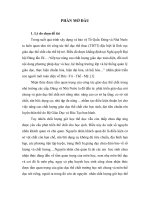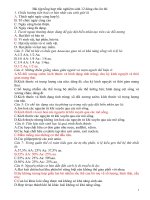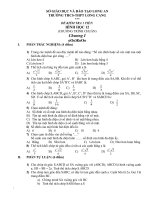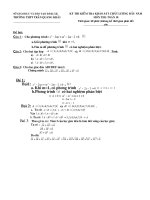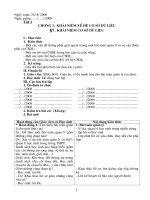Projekt3a foreign teachers introduction 08 12 09 (1)
Bạn đang xem bản rút gọn của tài liệu. Xem và tải ngay bản đầy đủ của tài liệu tại đây (867.58 KB, 34 trang )
Project: COMMUNICATION IN FOREIGN LANGUAGES
Implementing innovative approaches
to foreign language teaching through
foreign teachers inclusion into the school
curriculum
FOREIGN TEACHERS’ MEETING
Katja Pavlič Škerjanc, 9/12- 2008
Operacijo delno financira Evropska unija iz Evropskega socialnega sklada ter Ministrstvo za šolstvo in šport. Operacija se izvaja v okviru
Operativnega programa razvoja človeških virov v obdobju 2007-2013, razvojne prioritete: Razvoj človeških virov in vseživljenjsko učenje;
prednostne usmeritve: Izboljšanje kakovosti in učinkovitosti sistemov izobraževanja in usposabljanja.
FOREIGN TEACHERS (of foreign
languages) IN SLOVENE SCHOOLS
Seeking employment:
Whom to turn to?
Teaching jobs?
• CMEPIUS (= Centre of the Republic • Comenius language
of Slovenia for Mobility and European
assistants (European funding)
Educational and Training programmes)
• Ministry of Education and
Sport, International Cooperation and
European Affairs Service (bilateral in
multilateral co-operation: Bronka Straus)
• The National Education
Institute, Centre for Development
and Research, Katja Pavlič Škerjanc
• DSD teachers (national funding)
• Austrian FL teachers (national
funding)
• Foreign FL teachers in
European classes (national
funding)
• Foreign FL teachers
(European funding - ESF)
ACCESS TO
ELECTRONIC INFORMATION
ZAVOD REPUBLIKE SLOVENIJE ZA ŠOLSTVO
(The National Education Institute)
/>Pogosto obiskane strani
Tuji učitelji pri pouku tujega jezika
/>
FOREIGN TEACHERS
OF FOREIGN LANGUAGES
• from a national programme run by the Ministry of
Education and Sport (“Foreign language
teachers in Slovenia”)…
• … to a curriculum development project run by
the National Education Institute and funded
mostly from the European Structural Funds
(Euopean Social Fund, ESF) (“Communication
in Foreign Languages - Implementing innovative
approaches to foreign language teaching through
foreign teachers inclusion into the school
curriculum”)
► KEY DIFFERENCES
KEY CONCEPTS
School development – Pilot projects –
Dissemination of results
• Intercultural
(communicative)
competence
• Authenticity (of learning
goals and objectives,
learning situations,
assessment)
• Language across the
curriculum (contentbased language learning,
discipline literacy
development)
• School curriculum
(planning – implementation –
monitoring – evaluationdissemination)
• Integrative curriculum
(cross-curricular connections –
intra- and interdisciplinary
cooperation)
• Cooperative teaching
– Team teaching
• Project approach (to
teaching and learning)
DEVELOPMENT - INNOVATION
SCHOOL
PROJECTS
Ministry of Education
and Sport
STRATEGIC LEVEL
National Education
Institute
→ concepts
(“white books),
development strategies
(strategic papers)
→ frameworks and
guidelines
TACTICAL LEVEL
Schools
OPERATIONAL
LEVEL
→ monitored and evaluated
implementation,
feedback on suggested
solutions,
dissemination of results
KEY DIFFERENCES
•
•
•
•
•
•
Not a programme, but a development project.
A systemic national development project, pursuing its goals
through school development projects.
A European Social Fund project – strict observance of regulations,
particularly reporting on activities – “acceptable evidence”
(prerequisite for funding).
Schools follow the same employment procedures as for Slovene
citizens – no mediation by the ministry or the NEI (mutual
recognition of qualifications!)!
The foreign teacher is a co-teacher, a teaching partner, not an
assistant, expected to become a vital member of the school
project team; former mentors become FL coordinators.
Co-teaching follows the collaborative teaching philosophy and
principles, non necessarily type A team teaching.
• Idea sharing (structured &
guided)
• Discussion groups (guided)
• Peer observation
• Joint teaching activities
(student projects, homework etc.)
– between classes at school level
– between schools on national and
international level
• Teacher exchanges
– between classes at school level
– between schools on national and
international level
• Team teaching (type A and
type B)
COLLABORATIVE
TEACHING
Aims and goals of the project
FOREIGN TEACHERS
• upgrading the quality of foreign language teaching in
Slovenia by innovative approaches, based on
– an enhanced authenticity of learning situations
(communication with a native speaker of the target language or a
non-native speaker with other FL1 than Slovene and using the
target language as a lingua franca)
and
– cooperative teaching in multicultural teams
(Slovene & foreign teachers of foreign languages, Slovene
teachers of non-language subjects & foreign teachers of foreign
languages);
• developing a systemic approach to foreign teachers
inclusion into the Slovene educational system piloting alternative organizational options
NATIONAL PROJECT TEAM (NPT)
Project manager
core NPT, extended NPT, enlarged NPT
SPT
managers/leaders
Working Groups (WG)
School Project Teams (SPT)
PROJECT
STRUCTURE
External
◄collaborators
• Slovene and
foreign teachers
• academic experts
PROJECT
STRUCTURE
• National Project Team (NPT)
– core NPT (Katja Pavlič Škerjanc, project manager – NEI, Maja
Celestina, NEI; Barbara Gregorič – financial matters, NEI;
Domen Petelin – legal matters, NEI; Bronka Straus, MES)
– extended NPT (core NPT + NEI foreign language advisers)
– enlarged NPT (extended NPT + school project team leaders +
school FL coordinators + selected foreign teachers/one per
language)
• School Project Teams (SPT) (3 – 5 members)
– Project team leader
– Foreign language coordinator
– Foreign teacher
– Other teachers according to the school project goals
FOREIGN TEACHER: ROLE AND TASKS
• The foreign teacher is an autonomous, independent
expert, expected to contribute creatively and innovatively
to the quality of foreign language teaching and the school
development project.
• He/She is non only an ambassador of the culture he/she
comes from but also an active promoter of multiculturality
and interculturality.
• He/She (co)-teaches in all parts of the curriculum:
– core and elective (80% of the direct instruction/teaching
workload),
– optional (up to 10 % of the teaching workload) and
– extra-curricular activities (up to 10 % of the teaching
workload).
Like Slovene teachers, foreign teachers will be required to be available
for work at all times when the school is open and at other such times
as the principal/headteacher or governing body may reasonably
direct.
WORK OBLIGATIONS
and HOURS OF WORK
• full working hours (40 hours per week)
• which equals 20 teaching hours per week at a
secondary school and 22 teaching hours per week at
a primary school plus other obligatory working activities
(see next slide)
• on the basis of collaborative teaching with Slovene
teachers of foreign languages and non-language
subjects (favoured approaches: LAC language across the
curriculum: CBLL content-based language learning, interdisciplinary
teaching/learning, discipline literacy development, project-based
teaching/learning etc.)
WORK OBLIGATIONS
and HOURS OF WORK
• preparation and lesson planning in accordance with
the principles of collaborative teaching
• other activities in accordance with the aims and goals
of the national development project
– professional development activities: participation in
seminars, workshops etc. organized by NEI
– development project activities: materials writing,
curriculum design etc.
• other obligations in accordance with the relevant
legislation
• possible co-operation with the National Education
Institute in accordance with an agreement between the
school and the NEI
A sample average weekly
foreign teacher’s teaching workload
• 14 teaching hours in (foreign) language teams
(collaborative teaching, preferably type A team teaching)
• 1 teaching hour in multidisciplinary teams
(interdisciplinary teaching, foreign teacher as a language expert,
collaborative teaching – team teaching)
• 2 teaching hours of individulised/personalised
instruction (working with students showing learning difficulties
or/and gifted students)
• 1 teaching hour of optional curricular activities
• 2 teaching hours of extra-curricular activities
A record of hours worked (preparation and other activities included!)
will have to be maintained via timesheets on a daily basis!
“FOREIGN” TEACHING?
• Native speaker vs.
TEACHER ?
– foreign language
teacher OR
– subject teacher with
a FL teaching
certificate?
• Monocultural vs.
intercultural
teacher?
• Target language =
– first (mother)
tongue?
– second language
(bilingual – bicultural
speakers)?
– foreign language
(but with a
first/second
language and culture
other than Slovene)?
QUALIFICATION REQUIREMENTS –
PROFESSIONAL COMPETECES?
•
•
•
knowledge of content
knowledge of learners &
learning
knowledge of general
pedagogy
knowledge of
curriculum
knowledge of context
knowledge of self
(1995)
◄
TEACHER’S
KNOWLEDGE
Teachers should be able to:
• work with information,
•
technology and knowledge;
•
• work with their fellow human
•
beings – learners, colleagues
and other partners in
TEACHER COMPETENCES ►
education;
Common European Principles for
Teacher Competences and
• work with and in society - at
Qualifications (2005)
local, regional, national,
European and broader global
levels.
/>
Teacher’s knowledge
Grossman, P. L. (1995). Teachers' knowledge. In L. W. Anderson (Ed.), International
encyclopedia of teaching and teacher education (2nd ed., pp. 20-24).
Knowledge of
content
Includes subject matter knowledge and pedagogical (how to
teach) content knowledge
Knowledge of
learners and
learning
Includes knowledge of learning theories; the physical, social,
psychological and cognitive development of students; motivational
theory and practice; and ethnic, gender and socio-economic
diversity
Knowledge of
general pedagogy
Includes knowledge of classroom organisation and management,
and general methods of teaching
Knowledge of
curriculum
Includes knowledge of processes of curriculum development and
of the school curriculum within and across grade levels
Knowledge of
context
Includes knowledge of multiple and embedded situations and
settings of teachers' work - school, district, region and state; also,
knowledge of students, families and local communities, historical,
philosophical and cultural foundations of education in particular
countries
Knowledge of self
Includes knowledge of personal values, dispositions, strengths
and weaknesses, personal educational philosophies, goals for
students and purposes for teaching
Continuum of learning
Feiman-Nemser, S. (2001). From preparation to practice: Designing a continuum to
strengthen and sustain teaching. Teachers College Record, 103(6), 1013-1055.
Central tasks of learning to teach
Preservice
Induction
Continuing professional
development
1. Examine beliefs critically
in relation to vision of good
teaching
1. Learn the context students, curriculum,
school community
1. Extend and deepen
subject matter knowledge
for teaching
2. Develop subject matter
knowledge for teaching
2. Design responsive
instructional programs
2. Extend and refine
repertoire in curriculum,
instruction and assessment
3. Develop an
understanding of learners,
learning and issues of
diversity
3. Create a classroom
learning community
4. Develop the tools and
dispositions to study
teaching
4. Develop a professional
identity
3. Strengthen skills and
dispositions to study and
improve teaching
TEACHER COMPETENCES ►
Common European Principles for Teacher
Competences and Qualifications (2005)
TEACHER COMPETENCES ►
Common European Principles for Teacher
Competences and Qualifications (2005)
TEACHER COMPETENCES ►
Common European Principles for Teacher
Competences and Qualifications (2005)
NOVE VLOGE UČITELJA
in učiteljev profesionalni razvoj
New roles and professional development
• posredovalec znanja → svetovalec za učenje
knowledge provider → learning counselor
• uvajalec sprememb – change agent
• raziskovalec - researcher
• sooblikovalec kurikula – curriculum designer
• ustvarjalec učnih gradiv – materials writer
• ocenjevalec/evalvator kakovosti… - evaluator
• itd. – etc.

